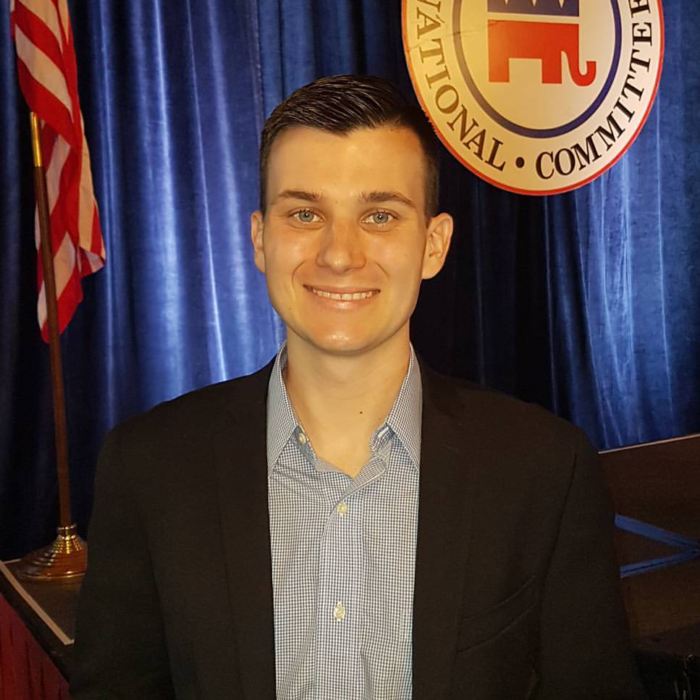UF CJC Online Profiles: Patrick O’Keefe
By Matthew Arrojas, UF Journalism Student
September 14, 2018
Maryland hasn’t re-elected a Republican governor since 1954. To put that into perspective, Dwight D. Eisenhower was still serving his first term as President then.
Now, with Republican Governor Larry Hogan running for re-election in November’s midterms, the party has a chance to break their 64-year-long slump.
Patrick O’Keefe, executive director of the Maryland Republican Party and the program director for the online master’s specializing in political communications at UF, is looking to do exactly this. While serving on the advisory board for the CJC Online political communications program, he’ll be advising Republican candidates across Maryland, from the governor’s race to individual state house races.
 To O’Keefe, the path to victory, while always changing and impossible to predict perfectly, likely lies in pushing digital and bringing the party further into the 21st century. He said that while old methods like mailers and T.V. ads still have their place in modern campaigns, things like text messaging and social media ads are seeing an increased relevance year after year.
To O’Keefe, the path to victory, while always changing and impossible to predict perfectly, likely lies in pushing digital and bringing the party further into the 21st century. He said that while old methods like mailers and T.V. ads still have their place in modern campaigns, things like text messaging and social media ads are seeing an increased relevance year after year.
However, as part of the party and not in charge of any campaigns directly, much of his job is spent educating the old guard on the importance of digital communication and offering strategy recommendations.
“There’s definitely a big generation gap between people in their twenties that grew up on [digital] and have a background in it, and then the people who are in their fifties or sixties that are still involved in campaigns and they don’t use it themselves, so it’s not really something they focus on,” O’Keefe said.
He added that it is sometimes difficult to push for any specific methods in digital considering the medium is constantly changing. Not only is the jury not out on many of these practices, but with tech companies like Google and Facebook constantly changing advertising rules, political communication is forced to adapt for every election.
“The only way you can really know is trying it out and testing it to see what works, because they don’t really give up their secret sauce,” O’Keefe said. “It’s more art than science. Every day it can change.”
The constantly changing world of political communications makes it equally difficult to craft curriculum for the CJC Online program, which is why he said advisers are regularly in communication with one another to figure out what’s working and what needs to be stressed more in classes.
Moving forward, the importance of online video is something to keep an eye out for in O’Keefe’s program. Also, the evolution of polling in an age where most people don’t have land lines anymore.
Equally important, O’Keefe said that he is always on the lookout for what doesn’t work in his field. Mainly, how many campaigns don’t understand targeting and are not reaching the audience they should be.
“I think that’s really going to be the challenge,” he said. “What’s the most efficient way to target? How do you make sure you’re not wasting your money? That’s going to be something that everyone’s going to have to contend with.”
He said that just the other day he got an advertisement for a candidate from another state.
“I should never be in your universe. I should never see that advertisement.”
With every dollar being so valuable in a campaign, O’Keefe said that small mistakes like that can add up. Already there is much contention around the best ways to spend campaign money. Do you spend the overwhelming majority of you cash reserves in the last two months of an election when everybody is paying attention, or do you try to build more name recognition early to get the ball rolling?
To him, more campaigns should be trying the latter option.
“I think success breeds success, too, where if you go in and are showing better numbers and showing momentum, that that will let you raise more money,” he said. “These are the debates that everyone has.”
A limited amount of money is something that affects all aspects of a campaign. O’Keefe said that there is still debate over what percentage of the budget should be put into digital versus television versus direct mail. Digital is still such a relatively new addition to campaigns, nobody really knows the “correct” amount candidates should spending on it, and some are hesitant to make room for this spending by cutting out more traditional methods of campaigning.
“Folks in digital, the biggest fight they have is fighting over a chunk of the budget and the biggest frustration for the people that are not in digital have is they don’t feel like it’s being effectively measured,” he said.
While there are still so many unanswered questions about the role of digital communications in politics, campaigns will need to campaign nonetheless, and the CJC master’s program will continue to prepare students for the road ahead.
“The only thing you know is that campaigns have an end date, and at that date whatever the result is the result.”
As it stands now, Maryland Governor Larry Hogan has a sizeable 16-point lead over his Democratic challenger Ben Jealous according to a recent poll, so O’Keefe must be doing something right. But, like he said, the world of politics is constantly shifting and everything can change in a matter of moments.
Posted: November 27, 2018
Category: UF CJC Online Blog, UF CJC Online Profiles


